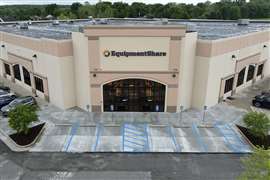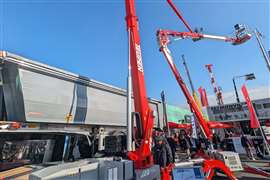Shifting sands: Has Dubai's construction sector bubble burst?
18 May 2009

Many of Dubai's iconic construction projects are either cancelled or on hold, contractors and consultants are laying off staff as government-backed developers are accused of taking too long to pay for work already done, while the mainly Asian labour force is beginning to openly question living conditions and pay. Has the bubble finally burst for Dubai? Richard High reports.
Never one to miss out on a boom Dubai's construction sector could now be in danger of collapsing. Where once there was a never ending list of wonders to announce and construct - islands in the shape of whole continents, a canal that goes nowhere, the World's tallest building, biggest shopping mall or the Middle East's largest in-door ski slope - in recent months many of the tiny Emirate's mainly government-backed developers have either cancelled or postponed hundreds of billions of dollars worth of projects.
The knock-on effect has been that contractors and consultants, many with expensive expat workforces, have cut thousands of jobs as the effects of the global credit crunch have brought Dubai's once thriving residential sector to its knees.
A recent report by HSBC said almost US$ 75 billion worth of property schemes in Dubai have been put on hold. Across the Gulf Cooperation Council (GCC) region as a whole, about US$ 249 billion worth of real estate and construction projects have been cancelled or put on hold, according to the Kuwait Financial Centre (Markaz), with the UAE hardest hit.
In February this year, Deyaar said it would put at least a quarter of projects on hold. While Limitless CEO Saeed Ahmed Saeed told iC that although bids for Phase 2 of its US$ 11 billion Arabian Canal development had "received a healthy response" the company had postponed the award of the contract in March.
The property arm of government-owned Dubai World, Limitless also cut 7% of its staff in March, saying it had made"a difficult but necessary decision in response to market conditions." While it is not planning any more layoffs, it "continues to review [its] recruitment plans during these challenging times."
Elsewhere, Nahkeel has cancelled or put on hold many projects, including its Nahkeel Harbour and Tower, the Trump International Hotel and Tower, and a US$ 3 billion mall expansion plan with South Korea's Samsung C&T. It has also axed 500 jobs.
There is also trouble outside the region for many developers. In Saudi Arabia, Emaar is currently appealing a SAR 4.5 billion (US$ 1.2 billion) lawsuit brought by Jadawel International following a dispute over the terms of joint-venture projects.
In September last year, the Country's arbitration authority dismissed the case but a new ruling could mean Emaar will have to give Jadawel, which is owned by Saudi billionaire Mohamed bin Issa al-Jaber, 18.61 million shares, pay US$ 228 million in damages and US$ 12 million in costs.
Dark clouds
While Limitless, like Emaar and Nakheel, has looked to expand its land bank elsewhere, with Jordan and Eygpt offering "real estate opportunities", according to Mr Saeed, parent company Dubai World has also experienced difficulties.
In the US its US$ 8.6 billion Las Vegas CityCenter project has run into problems over financing of the loans required to complete the project. In March it sued its development partner MGM Mirage, which was facing bankruptcy, to protect its US$ 3.6 billion investment.
While developers struggle at home and abroad there are other problems with Dubai's construction sector. In April, secret filming at Arabtec Construction's Nad al Sheba labour camp by the BBC current affairs programme Panorama, showed raw sewage flowing through the camp and over-crowded living conditions.
Workers were shown complaining about cramped living conditions, un-hygienic washrooms and toilets, poorly equipped kitchens and low wages. Rejecting the claims Arabtec Holding chief executive Riad Kamal said Arabtec, which employs 62000 people and is one of the UAE's largest contractors, had more than 20 camps in Dubai and Abu Dhabi, which were cleaned daily.
Arabian News reported that Mr Kamal said many of the workers came from poor backgrounds and their standard of cleanliness was not as high as the firm would like. Mr Kamal added that the basic monthly wage of an unskilled labourer based on an eight-hour day (six days a week) started at US$ 177, with skilled workers' wages starting at US$ 225.
The living conditions of its mainly Asian manual labour force are not the only cause for concern to Dubai's developers. A survey by recruitment company Bayt.com said 22000 expats are expected to leave the Middle East this year, so there could also be problems finishing those projects still underway as Dubai experiences a "brain drain" from its construction industry.
There could also be an exodus of contractors and consultants if payment for work already done is not more forthcoming. Earlier this month the UK's business secretary, raised concerns about the failure of developers in the UAE to pay British contractors following complaints that many had not been paid for six months.
In March Dubai received a US$ 10 billion loan from the UAE's federal government and as part of a US$ 20 billion bond issued by the emirate and funds are expected to start flowing to government-linked companies in the next few weeks.
But the problem can work both ways. Limitless CEO Mr Saeed told iC that the company is "currently having discussions with those of our large suppliers with whom we have long term on-going relationships about the value of the contracts we have with them. At the same time we are offering flexible payment plans to our own clients, on a case by case basis."
Silver lining
While many projects may have been put on hold those still turning have seen material costs fall by up to -30%, according to UAE daily Emirates Business. The -30% fall is strongly linked to the drop in the price of copper, steel, cement and transportation costs, which in turn are linked to falling oil prices.
Earlier this year, IIyas & Mustafa Galadari Group said the drop in material's prices has seen it save up to 20% on costs at its US$ 5 billion City of Arabia development.
Infrastructure construction is also still going strong, according to the latest report by India's RNCOS, UAE Construction Industry Outlook to 2012. The report said growing economic activity in the region and the emergence of the UAE as a business hub is "giving a further boost to already high infrastructure spending in the country", adding that "the infrastructure industry of the UAE is witnessing massive activity in the form of rising number of projects from private, public and government organizations."
All of which could explain why Dubai developer Deyaar epects to post "substantial" first quarter 2009 profits, following a +59% rise in net profits to AED 343 million (US$ 93 million) in the fourth quarter 2008. And in January Al Habtoor Leighton Group's order book in the Gulf stood at AED 30 billion (US$ 8.16 billion), "a record high", according to the company.
However, its Dubai Airport Concourse 3 scheme has been cancelled, so its share of the US$ 1.3 billion contract will have to be deducted from this figure.
Outlook
Limitless CEO Mr Saeed told iC he expects the next 12 months "will continue to be a challenge, but it's important to remain flexible, optimistic and committed, and remember that downturns do not last forever."
The company has recently re-focused on the affordable housing market, because Dubai, said Mr Saeed, "like everywhere, is facing challenges. However, we believe that by providing developments that address the market need[s], we will be in a strong position when recovery begins."
Mr Saeed was also quick to dispel suggestions that the Dubai construction boom had died an untimely death telling iC he remained "optimistic" for the future. While the sector has moved from, "Expanding at a rapid rate to a renewed pace, which focuses on matching quality with long term demand."






